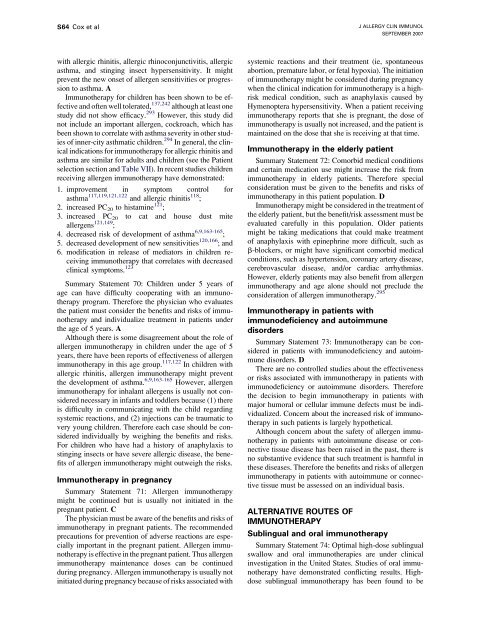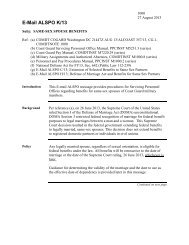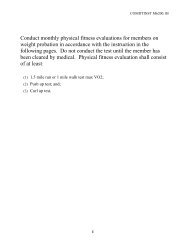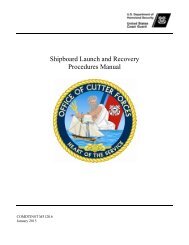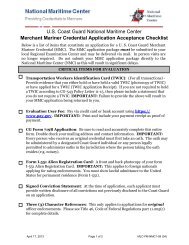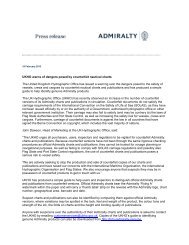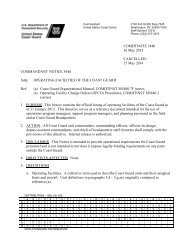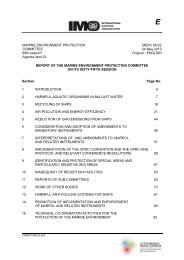Immunotherapy Safety for the Primary Care ... - U.S. Coast Guard
Immunotherapy Safety for the Primary Care ... - U.S. Coast Guard
Immunotherapy Safety for the Primary Care ... - U.S. Coast Guard
You also want an ePaper? Increase the reach of your titles
YUMPU automatically turns print PDFs into web optimized ePapers that Google loves.
S64 Cox et al<br />
J ALLERGY CLIN IMMUNOL<br />
SEPTEMBER 2007<br />
with allergic rhinitis, allergic rhinoconjunctivitis, allergic<br />
asthma, and stinging insect hypersensitivity. It might<br />
prevent <strong>the</strong> new onset of allergen sensitivities or progression<br />
to asthma. A<br />
<strong>Immuno<strong>the</strong>rapy</strong> <strong>for</strong> children has been shown to be effective<br />
and often well tolerated, 137,242 although at least one<br />
study did not show efficacy. 293 However, this study did<br />
not include an important allergen, cockroach, which has<br />
been shown to correlate with asthma severity in o<strong>the</strong>r studies<br />
of inner-city asthmatic children. 294 In general, <strong>the</strong> clinical<br />
indications <strong>for</strong> immuno<strong>the</strong>rapy <strong>for</strong> allergic rhinitis and<br />
asthma are similar <strong>for</strong> adults and children (see <strong>the</strong> Patient<br />
selection section and Table VII). In recent studies children<br />
receiving allergen immuno<strong>the</strong>rapy have demonstrated:<br />
1. improvement in symptom control <strong>for</strong><br />
asthma 117,119,121,122 and allergic rhinitis 118 ;<br />
2. increased PC 20 to histamine 121 ;<br />
3. increased PC 20 to cat and house dust mite<br />
allergens 121,149 ;<br />
4. decreased risk of development of asthma 6,9,163-165 ;<br />
5. decreased development of new sensitivities 120,166 ; and<br />
6. modification in release of mediators in children receiving<br />
immuno<strong>the</strong>rapy that correlates with decreased<br />
clinical symptoms. 123<br />
Summary Statement 70: Children under 5 years of<br />
age can have difficulty cooperating with an immuno<strong>the</strong>rapy<br />
program. There<strong>for</strong>e <strong>the</strong> physician who evaluates<br />
<strong>the</strong> patient must consider <strong>the</strong> benefits and risks of immuno<strong>the</strong>rapy<br />
and individualize treatment in patients under<br />
<strong>the</strong> age of 5 years. A<br />
Although <strong>the</strong>re is some disagreement about <strong>the</strong> role of<br />
allergen immuno<strong>the</strong>rapy in children under <strong>the</strong> age of 5<br />
years, <strong>the</strong>re have been reports of effectiveness of allergen<br />
immuno<strong>the</strong>rapy in this age group. 117,122 In children with<br />
allergic rhinitis, allergen immuno<strong>the</strong>rapy might prevent<br />
<strong>the</strong> development of asthma. 6,9,163-165 However, allergen<br />
immuno<strong>the</strong>rapy <strong>for</strong> inhalant allergens is usually not considered<br />
necessary in infants and toddlers because (1) <strong>the</strong>re<br />
is difficulty in communicating with <strong>the</strong> child regarding<br />
systemic reactions, and (2) injections can be traumatic to<br />
very young children. There<strong>for</strong>e each case should be considered<br />
individually by weighing <strong>the</strong> benefits and risks.<br />
For children who have had a history of anaphylaxis to<br />
stinging insects or have severe allergic disease, <strong>the</strong> benefits<br />
of allergen immuno<strong>the</strong>rapy might outweigh <strong>the</strong> risks.<br />
<strong>Immuno<strong>the</strong>rapy</strong> in pregnancy<br />
Summary Statement 71: Allergen immuno<strong>the</strong>rapy<br />
might be continued but is usually not initiated in <strong>the</strong><br />
pregnant patient. C<br />
The physician must be aware of <strong>the</strong> benefits and risks of<br />
immuno<strong>the</strong>rapy in pregnant patients. The recommended<br />
precautions <strong>for</strong> prevention of adverse reactions are especially<br />
important in <strong>the</strong> pregnant patient. Allergen immuno<strong>the</strong>rapy<br />
is effective in <strong>the</strong> pregnant patient. Thus allergen<br />
immuno<strong>the</strong>rapy maintenance doses can be continued<br />
during pregnancy. Allergen immuno<strong>the</strong>rapy is usually not<br />
initiated during pregnancy because of risks associated with<br />
systemic reactions and <strong>the</strong>ir treatment (ie, spontaneous<br />
abortion, premature labor, or fetal hypoxia). The initiation<br />
of immuno<strong>the</strong>rapy might be considered during pregnancy<br />
when <strong>the</strong> clinical indication <strong>for</strong> immuno<strong>the</strong>rapy is a highrisk<br />
medical condition, such as anaphylaxis caused by<br />
Hymenoptera hypersensitivity. When a patient receiving<br />
immuno<strong>the</strong>rapy reports that she is pregnant, <strong>the</strong> dose of<br />
immuno<strong>the</strong>rapy is usually not increased, and <strong>the</strong> patient is<br />
maintained on <strong>the</strong> dose that she is receiving at that time.<br />
<strong>Immuno<strong>the</strong>rapy</strong> in <strong>the</strong> elderly patient<br />
Summary Statement 72: Comorbid medical conditions<br />
and certain medication use might increase <strong>the</strong> risk from<br />
immuno<strong>the</strong>rapy in elderly patients. There<strong>for</strong>e special<br />
consideration must be given to <strong>the</strong> benefits and risks of<br />
immuno<strong>the</strong>rapy in this patient population. D<br />
<strong>Immuno<strong>the</strong>rapy</strong> might be considered in <strong>the</strong> treatment of<br />
<strong>the</strong> elderly patient, but <strong>the</strong> benefit/risk assessment must be<br />
evaluated carefully in this population. Older patients<br />
might be taking medications that could make treatment<br />
of anaphylaxis with epinephrine more difficult, such as<br />
b-blockers, or might have significant comorbid medical<br />
conditions, such as hypertension, coronary artery disease,<br />
cerebrovascular disease, and/or cardiac arrhythmias.<br />
However, elderly patients may also benefit from allergen<br />
immuno<strong>the</strong>rapy and age alone should not preclude <strong>the</strong><br />
consideration of allergen immuno<strong>the</strong>rapy. 295<br />
<strong>Immuno<strong>the</strong>rapy</strong> in patients with<br />
immunodeficiency and autoimmune<br />
disorders<br />
Summary Statement 73: <strong>Immuno<strong>the</strong>rapy</strong> can be considered<br />
in patients with immunodeficiency and autoimmune<br />
disorders. D<br />
There are no controlled studies about <strong>the</strong> effectiveness<br />
or risks associated with immuno<strong>the</strong>rapy in patients with<br />
immunodeficiency or autoimmune disorders. There<strong>for</strong>e<br />
<strong>the</strong> decision to begin immuno<strong>the</strong>rapy in patients with<br />
major humoral or cellular immune defects must be individualized.<br />
Concern about <strong>the</strong> increased risk of immuno<strong>the</strong>rapy<br />
in such patients is largely hypo<strong>the</strong>tical.<br />
Although concern about <strong>the</strong> safety of allergen immuno<strong>the</strong>rapy<br />
in patients with autoimmune disease or connective<br />
tissue disease has been raised in <strong>the</strong> past, <strong>the</strong>re is<br />
no substantive evidence that such treatment is harmful in<br />
<strong>the</strong>se diseases. There<strong>for</strong>e <strong>the</strong> benefits and risks of allergen<br />
immuno<strong>the</strong>rapy in patients with autoimmune or connective<br />
tissue must be assessed on an individual basis.<br />
ALTERNATIVE ROUTES OF<br />
IMMUNOTHERAPY<br />
Sublingual and oral immuno<strong>the</strong>rapy<br />
Summary Statement 74: Optimal high-dose sublingual<br />
swallow and oral immuno<strong>the</strong>rapies are under clinical<br />
investigation in <strong>the</strong> United States. Studies of oral immuno<strong>the</strong>rapy<br />
have demonstrated conflicting results. Highdose<br />
sublingual immuno<strong>the</strong>rapy has been found to be


